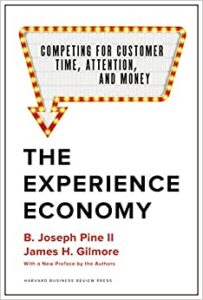The Future of the Experience Economy

LONG THINKER PANEL
By B. Joseph Pine II, co-founder of Strategic Horizons LLP and co-author of The Experience Economy: Competing for Customer Time, Attention, and Money
While the current state of the Experience Economy is poor, the future is bright. The worldwide response to COVID-19 has devastated the Experience Economy, tourism most of all. But people are social beings who will always crave social experiences where they gather with and around fellow human beings. Right now they’ve just shifted those experiences from out there to in here, from public to familial, from physical to digital.
People are social beings who will always crave social experiences where they gather with and around fellow human beings.
Destinations themselves must embrace digital, deploying digital technology to fuse the real and the virtual. The future of the Experience Economy involves experience platforms – genius platforms that not only sense and respond to individual visitor need but anticipate the needs of this visitor (and visiting unit) at this moment in time, enabling customized capabilities that will seem like superpowers.
Or not.
Every trend sows the seeds of its countertrend, and many will resist the increasing digitization of society, or at least want to elude it for time. You can choose to be such a destination. Whichever route, destinations in the future not only will but must charge for the visitor experience.
Every trend sows the seeds of its countertrend, and many will resist the increasing digitization of society.
You may label it a surcharge, a tax, a congestion fee – but you are better off calling it what it is: an admission fee. For admission fees serve a dual purpose: they send a signal that this is a place worth experiencing, while giving the place the wherewithal to continue staging an engaging, personal, and memorable experience. Redesign your destination to be worthy of an admission fee, and then charge for it as 17-Mile Drive in Pebble Beach and Venice do today.
Finally, recognize that as we’ve hunkered down in our homes, the pandemic has made us realize we don’t need more stuff; what we value are the experiences we have with our family, our friends, our colleagues that give life meaning. Destinations must give life meaning.
Don’t cater to ticking sites off the list, but to aligning your destination with the meaningful purpose of individual visitors and to helping them achieve the aspirations for which they left home, safety, and routine to journey out into the world for meaning, possibility, and transformation.
To aligning your destination with the meaningful purpose of individual visitors
For most of all, the future of the Experience Economy lies in opening up possibilities for meaningful transformation. The future of destinations is transformative travel.
***
![]() Strategic Horizons offers the tools, experiences, and education to explore and master today’s economic marketplace. Through speaking engagements, direct one-on-one guidance, workshops, and public events, you will find new ways to bring your business to the forefront of the Experience Economy. Using innovative performance techniques refined through thousands of client engagements, Strategic Horizons provides wholly unique perspectives and learning solutions.
Strategic Horizons offers the tools, experiences, and education to explore and master today’s economic marketplace. Through speaking engagements, direct one-on-one guidance, workshops, and public events, you will find new ways to bring your business to the forefront of the Experience Economy. Using innovative performance techniques refined through thousands of client engagements, Strategic Horizons provides wholly unique perspectives and learning solutions.
The Experience Economy, With a New Preface by the Authors: Competing for Customer Time, Attention, and Money
Time is limited. Attention is scarce. Are you engaging your customers?
Apple Stores, Disney, LEGO, Starbucks. Do these names conjure up images of mere goods and services, or do they evoke something more–something  visceral?
visceral?
Welcome to the Experience Economy, where businesses must form unique connections in order to secure their customers’ affections–and ensure their own economic vitality.
This seminal book on experience innovation by Joe Pine and Jim Gilmore explores how savvy companies excel by offering compelling experiences for their customers, resulting not only in increased customer allegiance but also in a more profitable bottom line. Translated into thirteen languages, The Experience Economy has become a must-read for leaders of enterprises large and small, for-profit and nonprofit, global and local.
Now with a brand-new preface, Pine and Gilmore make an even stronger case for experiences as the critical link between a company and its customers in an increasingly distractible and time-starved world. Filled with detailed examples and actionable advice, The Experience Economy helps companies create personal, dramatic, and even transformative experiences, offering the script from which managers can generate value in ways aligned with a strong customer-centric strategy.